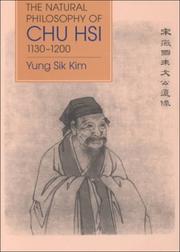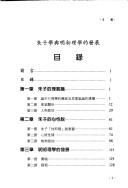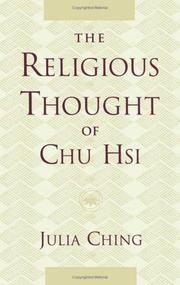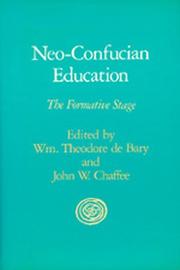| Listing 1 - 10 of 14 | << page >> |
Sort by
|

ISBN: 087169235X 9780871692351 Year: 2000 Volume: 235 Publisher: Philadelphia: American philosophical society,
Abstract | Keywords | Export | Availability | Bookmark
 Loading...
Loading...Choose an application
- Reference Manager
- EndNote
- RefWorks (Direct export to RefWorks)
Neo-Confucianism. --- Philosophy and science. --- Neo-Confucianism --- Philosophy and science --- Science and philosophy --- Science --- Confucianism --- Philosophy, Chinese --- Zhu, Xi, --- Chu, Hsi, --- C̄ū, Hī, --- Chu, Hi, --- Choo, He, --- Tschu, Hi, --- Shu, Ki, --- Chu, Hy, --- Tchou, Hi, --- Chu, Hũi, --- Tchu-hi, --- 朱熹, --- Zhu, Fuzi, --- Chu, Fu-tzu, --- Choo-Foo-Tze, --- Choo-foo-tsze, --- Chu, Puja, --- 朱夫子, --- Zhu, Zi, --- Chu, Tzu, --- Zhuzi, --- Chu-tzu, --- Chuja, --- Shu-shi, --- Shushi, --- 朱子, --- Zhu, Yuanhui, --- Chu, Yüan-hui, --- 朱元晦, --- Zhu, Zhonghui, --- Chu, Chung-hui, --- 朱仲晦, --- Zhu, Hui'an, --- Chu, Hui-an, --- 朱晦庵, --- Zhu, Huiweng, --- Chu, Hui-weng, --- 朱晦翁, --- Zhu, Dunweng, --- Chu, Tun-weng, --- 朱遯翁, --- Yungulaoren, --- Yün-ku-lao-jen, --- 云谷老人, --- Cangzhoubingsou, --- Tsʻang-chou-ping-sou, --- 沧洲病叟, --- Zhu, Ziyang, --- Chu, Tzu-yang, --- 朱紫陽, --- 朱紫阳, --- Chu, Hsi --- C̄ū, Hī --- Chu, Hi --- Choo, He --- Tschu, Hi --- Shu, Ki --- Chu, Hy --- Tchou, Hi --- Chu, Hũi --- Tchu-hi --- 朱熹
Book
ISBN: 0312134703 Year: 1987 Publisher: Hong Kong Chinese university press
Abstract | Keywords | Export | Availability | Bookmark
 Loading...
Loading...Choose an application
- Reference Manager
- EndNote
- RefWorks (Direct export to RefWorks)
S12/0433 --- Philosophers --- -Scholars --- China: Philosophy and Classics--Zhu Xi --- Zhu, Xi --- Zhu, Xi, --- -China: Philosophy and Classics--Zhu Xi --- Chu, Hsi --- Chu, Jih-hsi --- Zhu, Rixi --- 朱希 --- 朱喜 --- 朱洗 --- 朱溪 --- 朱旭 --- 朱曦 --- 朱晞 --- 朱禧 --- 朱玺 --- 朱璽 --- 朱熹 --- 朱西 --- 朱錫 --- 朱锡 --- 竹西 --- Chu, Hsi, --- C̄ū, Hī, --- Chu, Hi, --- Choo, He, --- Tschu, Hi, --- Shu, Ki, --- Chu, Hy, --- Tchou, Hi, --- Chu, Hũi, --- Tchu-hi, --- 朱熹, --- Zhu, Fuzi, --- Chu, Fu-tzu, --- Choo-Foo-Tze, --- Choo-foo-tsze, --- Chu, Puja, --- 朱夫子, --- Zhu, Zi, --- Chu, Tzu, --- Zhuzi, --- Chu-tzu, --- Chuja, --- Shu-shi, --- Shushi, --- 朱子, --- Zhu, Yuanhui, --- Chu, Yüan-hui, --- 朱元晦, --- Zhu, Zhonghui, --- Chu, Chung-hui, --- 朱仲晦, --- Zhu, Hui'an, --- Chu, Hui-an, --- 朱晦庵, --- Zhu, Huiweng, --- Chu, Hui-weng, --- 朱晦翁, --- Zhu, Dunweng, --- Chu, Tun-weng, --- 朱遯翁, --- Yungulaoren, --- Yün-ku-lao-jen, --- 云谷老人, --- Cangzhoubingsou, --- Tsʻang-chou-ping-sou, --- 沧洲病叟, --- Zhu, Ziyang, --- Chu, Tzu-yang, --- 朱紫陽, --- 朱紫阳, --- C̄ū, Hī --- Chu, Hi --- Choo, He --- Tschu, Hi --- Shu, Ki --- Chu, Hy --- Tchou, Hi --- Chu, Hũi --- Tchu-hi

ISBN: 9571505900 Year: 1994 Publisher: 臺北 臺灣學生書局
Abstract | Keywords | Export | Availability | Bookmark
 Loading...
Loading...Choose an application
- Reference Manager
- EndNote
- RefWorks (Direct export to RefWorks)
S12/0433 --- S12/0212 --- China: Philosophy and Classics--Zhu Xi --- China: Philosophy and Classics--Logics --- Neo-Confucianism. --- Zhu, Xi, --- Neo-Confucianism --- Confucianism --- Philosophy, Chinese --- Chu, Hsi, --- C̄ū, Hī, --- Chu, Hi, --- Choo, He, --- Tschu, Hi, --- Shu, Ki, --- Chu, Hy, --- Tchou, Hi, --- Chu, Hũi, --- Tchu-hi, --- 朱熹, --- Zhu, Fuzi, --- Chu, Fu-tzu, --- Choo-Foo-Tze, --- Choo-foo-tsze, --- Chu, Puja, --- 朱夫子, --- Zhu, Zi, --- Chu, Tzu, --- Zhuzi, --- Chu-tzu, --- Chuja, --- Shu-shi, --- Shushi, --- 朱子, --- Zhu, Yuanhui, --- Chu, Yüan-hui, --- 朱元晦, --- Zhu, Zhonghui, --- Chu, Chung-hui, --- 朱仲晦, --- Zhu, Hui'an, --- Chu, Hui-an, --- 朱晦庵, --- Zhu, Huiweng, --- Chu, Hui-weng, --- 朱晦翁, --- Zhu, Dunweng, --- Chu, Tun-weng, --- 朱遯翁, --- Yungulaoren, --- Yün-ku-lao-jen, --- 云谷老人, --- Cangzhoubingsou, --- Tsʻang-chou-ping-sou, --- 沧洲病叟, --- Zhu, Ziyang, --- Chu, Tzu-yang, --- 朱紫陽, --- 朱紫阳, --- Chu, Hsi --- C̄ū, Hī --- Chu, Hi --- Choo, He --- Tschu, Hi --- Shu, Ki --- Chu, Hy --- Tchou, Hi --- Chu, Hũi --- Tchu-hi --- 朱熹
Book
ISBN: 9781438458380 9781438458373 9781438458397 1438458398 1438458371 Year: 2015 Publisher: Albany
Abstract | Keywords | Export | Availability | Bookmark
 Loading...
Loading...Choose an application
- Reference Manager
- EndNote
- RefWorks (Direct export to RefWorks)
Zhu Xi (1130–1200), the chief architect of neo-Confucian thought, affected a momentous transformation in Chinese philosophy. His ideas came to dominate Chinese intellectual life, including the educational and civil service systems, for centuries. Despite his influence, Zhu Xi is known as the "great synthesizer" and rarely appreciated as a thinker in his own right. This volume presents Zhu Xi as a major world philosopher, one who brings metaphysics and cosmology into attunement with ethical and social practice. Contributors from the English- and Chinese-speaking worlds explore Zhu Xi's unique thought and offer it to the Western philosophical imagination. Zhu Xi's vision is critical, intellectually rigorous, and religious, telling us how to live in the transforming world of li—the emergent, immanent, and coherent patternings of natural and human milieu.
Zhu, Xi, --- S12/0433 --- China: Philosophy and Classics--Zhu Xi. --- China: Philosophy and Classics--Zhu Xi --- Chu, Hsi, --- C̄ū, Hī, --- Chu, Hi, --- Choo, He, --- Tschu, Hi, --- Shu, Ki, --- Chu, Hy, --- Tchou, Hi, --- Chu, Hũi, --- Tchu-hi, --- 朱熹, --- Zhu, Fuzi, --- Chu, Fu-tzu, --- Choo-Foo-Tze, --- Choo-foo-tsze, --- Chu, Puja, --- 朱夫子, --- Zhu, Zi, --- Chu, Tzu, --- Zhuzi, --- Chu-tzu, --- Chuja, --- Shu-shi, --- Shushi, --- 朱子, --- Zhu, Yuanhui, --- Chu, Yüan-hui, --- 朱元晦, --- Zhu, Zhonghui, --- Chu, Chung-hui, --- 朱仲晦, --- Zhu, Hui'an, --- Chu, Hui-an, --- 朱晦庵, --- Zhu, Huiweng, --- Chu, Hui-weng, --- 朱晦翁, --- Zhu, Dunweng, --- Chu, Tun-weng, --- 朱遯翁, --- Yungulaoren, --- Yün-ku-lao-jen, --- 云谷老人, --- Cangzhoubingsou, --- Tsʻang-chou-ping-sou, --- 沧洲病叟, --- Zhu, Ziyang, --- Chu, Tzu-yang, --- 朱紫陽, --- 朱紫阳, --- Chu, Hsi --- C̄ū, Hī --- Chu, Hi --- Choo, He --- Tschu, Hi --- Shu, Ki --- Chu, Hy --- Tchou, Hi --- Chu, Hũi --- Tchu-hi --- 朱熹 --- Zhu, Xi, 1130-1200.

ISBN: 0195091892 Year: 2001 Publisher: Oxford ; New York Oxford University Press
Abstract | Keywords | Export | Availability | Bookmark
 Loading...
Loading...Choose an application
- Reference Manager
- EndNote
- RefWorks (Direct export to RefWorks)
S12/0433 --- China: Philosophy and Classics--Zhu Xi --- Zhu, Xi --- -Views on religion --- -Chu, Hsi --- Chu, Jih-hsi --- Zhu, Rixi --- 朱希 --- 朱喜 --- 朱洗 --- 朱溪 --- 朱旭 --- 朱曦 --- 朱晞 --- 朱禧 --- 朱玺 --- 朱璽 --- 朱熹 --- 朱西 --- 朱錫 --- 朱锡 --- 竹西 --- Views on religion --- Zhu, Xi, --- Chu, Hsi, --- C̄ū, Hī, --- Chu, Hi, --- Choo, He, --- Tschu, Hi, --- Shu, Ki, --- Chu, Hy, --- Tchou, Hi, --- Chu, Hũi, --- Tchu-hi, --- 朱熹, --- Zhu, Fuzi, --- Chu, Fu-tzu, --- Choo-Foo-Tze, --- Choo-foo-tsze, --- Chu, Puja, --- 朱夫子, --- Zhu, Zi, --- Chu, Tzu, --- Zhuzi, --- Chu-tzu, --- Chuja, --- Shu-shi, --- Shushi, --- 朱子, --- Zhu, Yuanhui, --- Chu, Yüan-hui, --- 朱元晦, --- Zhu, Zhonghui, --- Chu, Chung-hui, --- 朱仲晦, --- Zhu, Hui'an, --- Chu, Hui-an, --- 朱晦庵, --- Zhu, Huiweng, --- Chu, Hui-weng, --- 朱晦翁, --- Zhu, Dunweng, --- Chu, Tun-weng, --- 朱遯翁, --- Yungulaoren, --- Yün-ku-lao-jen, --- 云谷老人, --- Cangzhoubingsou, --- Tsʻang-chou-ping-sou, --- 沧洲病叟, --- Zhu, Ziyang, --- Chu, Tzu-yang, --- 朱紫陽, --- 朱紫阳, --- Chu, Hsi --- C̄ū, Hī --- Chu, Hi --- Choo, He --- Tschu, Hi --- Shu, Ki --- Chu, Hy --- Tchou, Hi --- Chu, Hũi --- Tchu-hi
Book
ISBN: 9789860234282 Year: 2010 Publisher: 臺北 國立臺灣大學出版中心
Abstract | Keywords | Export | Availability | Bookmark
 Loading...
Loading...Choose an application
- Reference Manager
- EndNote
- RefWorks (Direct export to RefWorks)
Neo-Confucianism. --- Neo-Confucianism --- Zhu, Xi, --- S01/0500 --- S12/0400 --- S12/0433 --- Confucianism --- Philosophy, Chinese --- China: Bibliography and reference--Sinology, sinological institutes, proceedings of conferences --- China: Philosophy and Classics--Kongzi 孔子 Confucius and Confucianism --- China: Philosophy and Classics--Zhu Xi --- Chu, Hsi --- C̄ū, Hī --- Chu, Hi --- Choo, He --- Tschu, Hi --- Shu, Ki --- Chu, Hy --- Tchou, Hi --- Chu, Hũi --- Tchu-hi --- Zhu, Fuzi, --- Chu, Fu-tzu, --- Choo-Foo-Tze, --- Choo-foo-tsze, --- Chu, Puja, --- 朱夫子, --- Zhu, Zi, --- Chu, Tzu, --- Zhuzi, --- Chu-tzu, --- Chuja, --- Shu-shi, --- Shushi, --- 朱子, --- Zhu, Yuanhui, --- Chu, Yüan-hui, --- 朱元晦, --- Zhu, Zhonghui, --- Chu, Chung-hui, --- 朱仲晦, --- Zhu, Hui'an, --- Chu, Hui-an, --- 朱晦庵, --- Zhu, Huiweng, --- Chu, Hui-weng, --- 朱晦翁, --- Zhu, Dunweng, --- Chu, Tun-weng, --- 朱遯翁, --- Yungulaoren, --- Yün-ku-lao-jen, --- 云谷老人, --- Cangzhoubingsou, --- Tsʻang-chou-ping-sou, --- 沧洲病叟, --- Zhu, Ziyang, --- Chu, Tzu-yang, --- 朱紫陽, --- 朱紫阳, --- 朱熹
Book
ISBN: 9781438458403 9781438458410 9781438458427 1438458428 143845841X Year: 2015 Publisher: Albany
Abstract | Keywords | Export | Availability | Bookmark
 Loading...
Loading...Choose an application
- Reference Manager
- EndNote
- RefWorks (Direct export to RefWorks)
This book discusses what a religiously grounded authority might look like from the viewpoints of the European Catholic Thomas Aquinas (1225–1274) and the Chinese Neo-Confucian Zhu Xi (1130–1200). The consideration of these two figures, immensely influential in their respective traditions, reflects the conviction that any responsible discourse on authority must consider different cultural perspectives. Catherine Hudak Klancer notes that both Zhu Xi and Aquinas conceive wisdom as including, yet surpassing, human reason. Both express an explicit faith in the moral order of the cosmos and the ethical potential of human beings. The systematic, idealistic approach common to both provides the cosmic, anthropological, and ethical elements needed for a comprehensive exploration of how to exercise and limit authority. Ultimately, Klancer writes, authority requires a particular virtue, hitherto latent in both scholars' work and in their lives as well. A person with this virtue—humble authority—is properly grounded in the sacred order, and fully cognizant in theory and in practice of the parameters of human nature and the responsibilities attendant upon the human role.
S12/0820 --- S12/0433 --- China: Philosophy and Classics--Comparative philosophy --- China: Philosophy and Classics--Zhu Xi --- Common good. --- Power (Philosophy) --- Authority. --- Political science --- Authoritarianism --- Consensus (Social sciences) --- Authority --- Ethics --- Philosophy --- Good, Common --- Public good --- Justice --- Public interest --- Zhu, Xi, --- Thomas, Aquinas, Saint, --- Chu, Hsi --- C̄ū, Hī --- Chu, Hi --- Choo, He --- Tschu, Hi --- Shu, Ki --- Chu, Hy --- Tchou, Hi --- Chu, Hũi --- Tchu-hi --- Zhu, Fuzi, --- Chu, Fu-tzu, --- Choo-Foo-Tze, --- Choo-foo-tsze, --- Chu, Puja, --- 朱夫子, --- Zhu, Zi, --- Chu, Tzu, --- Zhuzi, --- Chu-tzu, --- Chuja, --- Shu-shi, --- Shushi, --- 朱子, --- Zhu, Yuanhui, --- Chu, Yüan-hui, --- 朱元晦, --- Zhu, Zhonghui, --- Chu, Chung-hui, --- 朱仲晦, --- Zhu, Hui'an, --- Chu, Hui-an, --- 朱晦庵, --- Zhu, Huiweng, --- Chu, Hui-weng, --- 朱晦翁, --- Zhu, Dunweng, --- Chu, Tun-weng, --- 朱遯翁, --- Yungulaoren, --- Yün-ku-lao-jen, --- 云谷老人, --- Cangzhoubingsou, --- Tsʻang-chou-ping-sou, --- 沧洲病叟, --- Zhu, Ziyang, --- Chu, Tzu-yang, --- 朱紫陽, --- 朱紫阳, --- 朱熹
Book
ISBN: 9789866741753 9866741753 Year: 2009 Publisher: 台南 復文圖書有限公司
Abstract | Keywords | Export | Availability | Bookmark
 Loading...
Loading...Choose an application
- Reference Manager
- EndNote
- RefWorks (Direct export to RefWorks)
Political science --- Rites and ceremonies --- Confucianism and state --- Philosophy. --- Zhu, Xi, --- China --- Politics and government --- S12/0433 --- China: Philosophy and Classics--Zhu Xi --- Zhu, Xi --- Chu, Hsi --- C̄ū, Hī --- Chu, Hi --- Choo, He --- Tschu, Hi --- Shu, Ki --- Chu, Hy --- Tchou, Hi --- Chu, Hũi --- Tchu-hi --- Zhu, Fuzi, --- Chu, Fu-tzu, --- Choo-Foo-Tze, --- Choo-foo-tsze, --- Chu, Puja, --- 朱夫子, --- Zhu, Zi, --- Chu, Tzu, --- Zhuzi, --- Chu-tzu, --- Chuja, --- Shu-shi, --- Shushi, --- 朱子, --- Zhu, Yuanhui, --- Chu, Yüan-hui, --- 朱元晦, --- Zhu, Zhonghui, --- Chu, Chung-hui, --- 朱仲晦, --- Zhu, Hui'an, --- Chu, Hui-an, --- 朱晦庵, --- Zhu, Huiweng, --- Chu, Hui-weng, --- 朱晦翁, --- Zhu, Dunweng, --- Chu, Tun-weng, --- 朱遯翁, --- Yungulaoren, --- Yün-ku-lao-jen, --- 云谷老人, --- Cangzhoubingsou, --- Tsʻang-chou-ping-sou, --- 沧洲病叟, --- Zhu, Ziyang, --- Chu, Tzu-yang, --- 朱紫陽, --- 朱紫阳, --- 朱熹
Book
ISBN: 9789004315457 9004315454 9004318739 9789004318731 Year: 2016 Volume: 132 Publisher: Leiden ; Boston Brill
Abstract | Keywords | Export | Availability | Bookmark
 Loading...
Loading...Choose an application
- Reference Manager
- EndNote
- RefWorks (Direct export to RefWorks)
Yan Yuan (1635-1704) has long been a controversial figure in the study of Chinese intellectual and cultural history. Although marginalized in his own time largely due to his radical attack on Zhu Xi (1130-1200), Yan was elevated to a great thinker during the early twentieth century because of the drastic changes of the modern Chinese intellectual climate. In Body, Ritual and Identity: A New Interpretation of the Early Qing Confucian Yan Yuan (1635-1704) , Yang Jui-sung has demonstrated that the complexity of Yan’s ideas and his hatred for Zhu Xi in particular need to be interpreted in light of his traumatic life experiences, his frustration over the fall of the Ming dynasty, and anxiety caused by the civil service examination system. Moreover, he should be better understood as a cultural critic of the lifestyle of educated elites of late imperial China. By critically analyzing Yan’s changing intellectual status and his criticism that the elite lifestyle was unhealthy and feminine, this new interpretation of Yan Yuan serves to shed new light on our understanding of the features as well as problems of educated elite culture in late imperial China.
S12/0450 --- S02/0210 --- China: Philosophy and Classics--Ming, Qing: later Confucian teachings, Sacred Edicts (incl. Wang Fuzhi, Yan Yuan, Li Kong, Dai Dongyuan) --- China: General works--Intellectuals: general and before 1840 --- Philosophers --- Confucianists --- Radicals --- Elite (Social sciences) --- Civil service --- Elites (Social sciences) --- Leadership --- Power (Social sciences) --- Social classes --- Social groups --- Ideological extremists --- Political extremists --- Extremists --- History. --- Examinations --- Yan, Yuan, --- Zhu, Xi, --- Chu, Hsi --- C̄ū, Hī --- Chu, Hi --- Choo, He --- Tschu, Hi --- Shu, Ki --- Chu, Hy --- Tchou, Hi --- Chu, Hũi --- Tchu-hi --- Zhu, Fuzi, --- Chu, Fu-tzu, --- Choo-Foo-Tze, --- Choo-foo-tsze, --- Chu, Puja, --- 朱夫子, --- Zhu, Zi, --- Chu, Tzu, --- Zhuzi, --- Chu-tzu, --- Chuja, --- Shu-shi, --- Shushi, --- 朱子, --- Zhu, Yuanhui, --- Chu, Yüan-hui, --- 朱元晦, --- Zhu, Zhonghui, --- Chu, Chung-hui, --- 朱仲晦, --- Zhu, Hui'an, --- Chu, Hui-an, --- 朱晦庵, --- Zhu, Huiweng, --- Chu, Hui-weng, --- 朱晦翁, --- Zhu, Dunweng, --- Chu, Tun-weng, --- 朱遯翁, --- Yungulaoren, --- Yün-ku-lao-jen, --- 云谷老人, --- Cangzhoubingsou, --- Tsʻang-chou-ping-sou, --- 沧洲病叟, --- Zhu, Ziyang, --- Chu, Tzu-yang, --- 朱紫陽, --- 朱紫阳, --- 朱熹 --- Yen, Yüan, --- Yan, Xizhai, --- Zhu, Bangliang, --- Siguren, --- Yan, Yizhi, --- Yen, Hsi-chai, --- Chu, Pang-liang, --- Ssu-ku-jen, --- Yen, I-chih, --- 顏元, --- 顔元, --- 颜元, --- Political and social views. --- Criticism and interpretation. --- Adversaries. --- China --- History

ISBN: 0520063937 Year: 1989 Publisher: Berkeley University of California Press
Abstract | Keywords | Export | Availability | Bookmark
 Loading...
Loading...Choose an application
- Reference Manager
- EndNote
- RefWorks (Direct export to RefWorks)
S14/0300 --- Education --- -Neo-Confucianism --- Confucianism --- Philosophy, Chinese --- Children --- Education, Primitive --- Education of children --- Human resource development --- Instruction --- Pedagogy --- Schooling --- Students --- Youth --- Civilization --- Learning and scholarship --- Mental discipline --- Schools --- Teaching --- Training --- China: Education--History of traditional education (incl. examination system) --- History --- -Education --- Zhu, Xi --- -Zhu, Xi --- Chu, Hsi --- Chu, Jih-hsi --- Zhu, Rixi --- 朱希 --- 朱喜 --- 朱洗 --- 朱溪 --- 朱旭 --- 朱曦 --- 朱晞 --- 朱禧 --- 朱玺 --- 朱璽 --- 朱熹 --- 朱西 --- 朱錫 --- 朱锡 --- 竹西 --- Neo-Confucianism --- Zhu, Xi, --- Chu, Hsi, --- C̄ū, Hī, --- Chu, Hi, --- Choo, He, --- Tschu, Hi, --- Shu, Ki, --- Chu, Hy, --- Tchou, Hi, --- Chu, Hũi, --- Tchu-hi, --- 朱熹, --- Zhu, Fuzi, --- Chu, Fu-tzu, --- Choo-Foo-Tze, --- Choo-foo-tsze, --- Chu, Puja, --- 朱夫子, --- Zhu, Zi, --- Chu, Tzu, --- Zhuzi, --- Chu-tzu, --- Chuja, --- Shu-shi, --- Shushi, --- 朱子, --- Zhu, Yuanhui, --- Chu, Yüan-hui, --- 朱元晦, --- Zhu, Zhonghui, --- Chu, Chung-hui, --- 朱仲晦, --- Zhu, Hui'an, --- Chu, Hui-an, --- 朱晦庵, --- Zhu, Huiweng, --- Chu, Hui-weng, --- 朱晦翁, --- Zhu, Dunweng, --- Chu, Tun-weng, --- 朱遯翁, --- Yungulaoren, --- Yün-ku-lao-jen, --- 云谷老人, --- Cangzhoubingsou, --- Tsʻang-chou-ping-sou, --- 沧洲病叟, --- Zhu, Ziyang, --- Chu, Tzu-yang, --- 朱紫陽, --- 朱紫阳, --- C̄ū, Hī --- Chu, Hi --- Choo, He --- Tschu, Hi --- Shu, Ki --- Chu, Hy --- Tchou, Hi --- Chu, Hũi --- Tchu-hi
| Listing 1 - 10 of 14 | << page >> |
Sort by
|

 Search
Search Feedback
Feedback About UniCat
About UniCat  Help
Help News
News